| Listing 1 - 10 of 12 | << page >> |
Sort by
|
Book
ISBN: 1280626984 9786610626984 3540292896 Year: 2006 Publisher: Berlin : Springer,
Abstract | Keywords | Export | Availability | Bookmark
 Loading...
Loading...Choose an application
- Reference Manager
- EndNote
- RefWorks (Direct export to RefWorks)
Kotulla, Deutsches Verfassungsrecht 1806 bis 1918 Das auf mehrere Bände angelegte Werk präsentiert nahezu das gesamte deutsche Verfassungsrecht des Zeitraumes zwischen 1806 und 1918. Hiermit wird der sich gleichsam schrittweise vollziehende Übergang von einem traditionell ständischen oder gar fürstlich-absolutistischen zu einem zumeist monarchisch-konstitutionellen System aufgearbeitet, dessen jäher Untergang schließlich in die nationalstaatlich-republikanisch geprägte demokratisch-parlamentarische Staatsform Weimars mündet. Mit dem Gesamtwerk steht dem Fachpublikum eine leicht zugängliche, bislang nicht gekannte Fülle von Dokumenten zur Verfügung, die für die verfassungsrechtliche Entwicklung Deutschlands und seiner einzelnen Staaten von zentraler Bedeutung waren. Dabei wird großer Wert auf die authentische, d. h. buchstaben- und zeichengetreue Übernahme der Texte gelegt. Dem jeweiligen Dokumententeil sind in jedem Band "Historische Einführungen" vorangestellt. In diesem Rahmen werden an den einschlägigen Dokumenten orientierte (verfassungs-) rechtliche, zeitlich wie territorial übergreifende entwicklungsgeschichtliche Darstellungen vorgenommen. 1. Band: Gesamtdeutschland, Anhaltische Staaten und Baden: Der vorliegende 1. Band enthält für sich genommen nahezu 390 Verfassungsrechtsdokumente nebst den dazugehörigen "Historischen Einführungen". Ihm sind zuvörderst die im Zeitraum zwischen 1806 und 1918 existierenden Verfassungsrechtsdokumente von gesamtdeutscher Bedeutung vorbehalten. Überdies trägt der Band aber auch mit dem in ihm niedergelegten Verfassungsrecht der Anhaltischen Herzogtümer (Anhalt, Anhalt-Bernburg, Anhalt-Dessau, Anhalt-Köthen) und Badens dem Verfassungsrecht der deutschen Einzelstaaten Rechnung.
Law—Philosophy. --- Law. --- Constitutional law. --- History. --- Theories of Law, Philosophy of Law, Legal History. --- Constitutional Law. --- History, general. --- Constitutional history --- Constitutional law
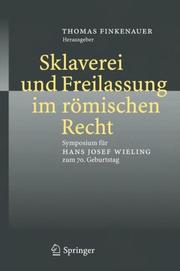
ISBN: 9783540369554 3540369538 9783540369530 3540369554 Year: 2006 Publisher: Berlin ; New York : Springer,
Abstract | Keywords | Export | Availability | Bookmark
 Loading...
Loading...Choose an application
- Reference Manager
- EndNote
- RefWorks (Direct export to RefWorks)
Der Sammelband vereinigt Beiträge vieler renommierter Romanisten zum römischen Sklavenrecht. Vermögensrechtliche Fragen, namentlich des Sondervermögens (peculium) von Sklaven, werden ebenso erörtert wie die soziale Stellung einzelner Sklavengruppen. Zudem werden ausführlich Probleme der Freilassung von Sklaven untersucht. Weitere Beiträge sind dem Verhältnis zwischen römischem Sklaventum und frühem Christentum sowie der mittelalterlichen Rezeption des antiken Sklavenrechts gewidmet. Ein Schrifttumsverzeichnis von Hans Wieling beschließt den Band.
Law. --- Roman Law/Law History/Canon Law. --- History. --- Law --- Droit --- Histoire --- Slavery (Roman law) --- Freedmen (Roman law) --- Cultural studies. --- Theories of Law, Philosophy of Law, Legal History. --- Cultural Studies. --- History, general. --- Philosophy. --- Law—Philosophy.
Book
ISBN: 1280620188 9786610620180 3540285148 Year: 2006 Publisher: Berlin : Springer,
Abstract | Keywords | Export | Availability | Bookmark
 Loading...
Loading...Choose an application
- Reference Manager
- EndNote
- RefWorks (Direct export to RefWorks)
Wie andere Gebräuche und Gepflogenheiten ist auch die „Festschrift-Kultur“ ins Gerede gekommen. Man mag das Für und Wider anderswo lange diskutieren – die Herausgeber dieser Festschrift sind überzeugt davon, dass sie eine der besten Möglichkeiten darstellt, einem weitsichtigen Wissenschaftler und engagierten- kademischen Lehrer Dank und Anerkennung zu zollen. Jeder, der sich daran bet- ligt, kann auf eine weitschweifige Laudatio verzichten und seine Wertschätzung durch die Tat bezeugen, mithin durch ein wissenschaftliches Opusculum. Auch wir, die Herausgeber, möchten diese Devise in Anspruch nehmen, wissen wir doch, dass dem Jubilar die Anerkennung durch die Tat lieber ist als die Lob- de. Gleichwohl kommen wir nicht umhin, der allgemeinen Übung zu entsprechen und Werdegang sowie Arbeitsfelder von Adolf Laufs in einem Vorwort anzusp- chen. Mehr noch: Lebensdaten und wissenschaftliches Werk weisen so viele Merkmale auf, die tiefere Zusammenhänge vermuten lassen und schon deshalb nicht unerwähnt bleiben dürfen. Am 18. 11. 1935 in Tuttlingen in eine kinderreiche Arztfamilie hineingeboren, verbrachte Adolf Laufs die Schulzeit in seiner schwäbischen Heimat. Das Studium der Rechtswissenschaft begann und beschloss er in Freiburg im Breisgau. Als S- dent und Referendar versäumte er nicht, Stationen in Berlin bzw. in Speyer ein- legen; in Freiburg wiederum promovierte er 1961 bei Hans Thieme und nach dem Assessorexamen, das er 1963 in Stuttgart abgelegt hatte, folgte eine kurze anwa- liche Tätigkeit in Tuttlingen.
Popular works. --- Law—Philosophy. --- Law. --- Medical laws and legislation. --- Civil law. --- Popular Science, general. --- Theories of Law, Philosophy of Law, Legal History. --- Medical Law. --- Civil Law. --- Law --- Medical laws and legislation --- Medical jurisprudence. --- History.
Book
ISBN: 1280459034 9786610459032 1402042124 Year: 2006 Volume: 59 Publisher: Dordrecht : Springer,
Abstract | Keywords | Export | Availability | Bookmark
 Loading...
Loading...Choose an application
- Reference Manager
- EndNote
- RefWorks (Direct export to RefWorks)
Rights language is a fundamental feature of the modern world. Virtually all significant social and political struggles are waged, and have been waged for over a century now, in terms of rights claims. In some ways, it is precisely the birth of modern rights language that ushers in modernity in terms of moral and political thought, and the struggle for a modern way of life seems for many synonymous with the fight for a universal recognition of equal, individual human rights. Where did modern rights language come from? What kinds of rights discourses is it rooted in? What is the specific nature of modern rights discourse; when and where were medieval and ancient notions of rights transformed into it? Can one in fact find any single such transformation of medieval into modern rights discourse? The present volume brings together some of the most central scholars in the history of medieval and early-modern rights discourse. Through the different angles taken by its authors, the volume brings to light the multifaceted nature of rights languages in the medieval and early modern world.
Human rights --- Civil rights --- Natural law --- History. --- Political science. --- Political Science. --- Human Rights. --- History, general. --- Theories of Law, Philosophy of Law, Legal History. --- Annals --- Auxiliary sciences of history --- Administration --- Civil government --- Commonwealth, The --- Government --- Political theory --- Political thought --- Politics --- Science, Political --- Social sciences --- State, The --- Human rights. --- Law—Philosophy. --- Law. --- Acts, Legislative --- Enactments, Legislative --- Laws (Statutes) --- Legislative acts --- Legislative enactments --- Jurisprudence --- Legislation --- Basic rights --- Civil rights (International law) --- Rights, Human --- Rights of man --- Human security --- Transitional justice --- Truth commissions --- Law and legislation
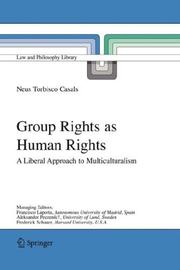
ISBN: 1280624868 9786610624867 1402042094 1402042086 9048170737 Year: 2006 Volume: v. 75 Publisher: Dordrecht : Springer,
Abstract | Keywords | Export | Availability | Bookmark
 Loading...
Loading...Choose an application
- Reference Manager
- EndNote
- RefWorks (Direct export to RefWorks)
Liberal theories have long insisted that cultural diversity in democratic societies can be accommodated through classical liberal tools, in particular through individual rights, and they have often rejected the claims of cultural minorities for group rights as illiberal. Group Rights as Human Rights argues that such a rejection is misguided. Based on a thorough analysis of the concept of group rights, it proposes to overcome the dominant dichotomy between "individual" human rights and "collective" group rights by recognizing that group rights also serve individual interests. It also challenges the claim that group rights, so understood, conflict with the liberal principle of neutrality; on the contrary, these rights help realize the neutrality ideal as they counter cultural biases that exist in Western states. Group rights deserve to be classified as human rights because they respond to fundamental, and morally important, human interests. Reading the theories of Will Kymlicka and Charles Taylor as complementary rather than opposed, Group Rights as Human Rights sees group rights as anchored both in the value of cultural belonging for the development of individual autonomy and in each person’s need for a recognition of her identity. This double foundation has important consequences for the scope of group rights: it highlights their potential not only in dealing with national minorities but also with immigrant groups; and it allows to determine how far such rights should also benefit illiberal groups. Participation, not intervention, should here be the guiding principle if group rights are to realize the liberal promise.
Ethnic groups --- Human rights --- Multiculturalism --- Legal status, laws, etc. --- Philosophy. --- Cultural diversity policy --- Cultural pluralism --- Cultural pluralism policy --- Ethnic diversity policy --- Social policy --- Anti-racism --- Ethnicity --- Cultural fusion --- Ethnic identities --- Ethnic nations (Ethnic groups) --- Groups, Ethnic --- Kindred groups (Ethnic groups) --- Nationalities (Ethnic groups) --- Peoples (Ethnic groups) --- Ethnology --- Government policy --- Political science --- Public law. --- Theories of Law, Philosophy of Law, Legal History. --- Political Philosophy. --- Public Law. --- Law --- Political philosophy --- Law—Philosophy. --- Law. --- Political philosophy. --- Public law . --- Acts, Legislative --- Enactments, Legislative --- Laws (Statutes) --- Legislative acts --- Legislative enactments --- Jurisprudence --- Legislation
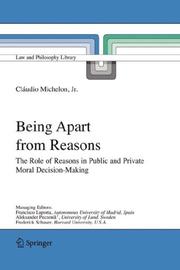
ISBN: 1280624922 9786610624928 1402042833 1402042825 9048170966 Year: 2006 Volume: v. 76 Publisher: Dordrecht : Springer,
Abstract | Keywords | Export | Availability | Bookmark
 Loading...
Loading...Choose an application
- Reference Manager
- EndNote
- RefWorks (Direct export to RefWorks)
Being Apart from Reasons deals with the question of how we should go about using reasons to decide what to do. More particularly, the book presents objections to the most common response given by contemporary legal and political theorists to the moral complexity of decision-making in modern societies, namely: the attempt to release public agents from their argumentative burden by insulating a particular set of reasons from the general pool of reasons and assigning the former systematic priority over all other reasons. If those attempts succeed, public agents should not reason comprehensively, taking into account all reasons and weighing them against one another. Some reasons would be excluded from decision-making by kind. That strategy is apparent both in Rawls’ claim that reasons concerning the right are systematically prior to reasons concerning the good and in Raz’s claim that pre-emptive reasons are systematically prior to first-order reasons. The same strategy is also instantiated by certain arguments for the procedural value of law, such as Jeremy Waldron’s. In the book, each of those arguments for the insulation of reasons is objected to in order to defend the thesis the reasoning by public agents must always be as comprehensive as possible. In order to reach that conclusion a particular picture of public decision-making is needed. That picture is provided by the comparison between the use of reasons in public and private decision-making which is carried out in the first two chapters of the book. That comparison brings to light peculiar features of public decision-making that imply the need for public agents to reason comprehensively before deciding. The remaining chapters object to those arguments mentioned above which aim at justifying the exclusion of certain reasons from public agents' decision-making.
Decision making --- Decision making. --- Reasoning. --- Moral and ethical aspects. --- Argumentation --- Ratiocination --- Reason --- Thought and thinking --- Judgment (Logic) --- Logic --- Deciding --- Decision (Psychology) --- Decision analysis --- Decision processes --- Making decisions --- Management --- Management decisions --- Choice (Psychology) --- Problem solving --- Decision-making (Ethics) --- Ethics --- Ethics. --- Philosophy of law. --- Political science --- Philosophy of Law. --- Political Philosophy. --- Theories of Law, Philosophy of Law, Legal History. --- Philosophy. --- Political philosophy --- Deontology --- Ethics, Primitive --- Ethology --- Moral philosophy --- Morality --- Morals --- Philosophy, Moral --- Science, Moral --- Philosophy --- Values --- Political science. --- Political philosophy. --- Law—Philosophy. --- Law. --- Acts, Legislative --- Enactments, Legislative --- Laws (Statutes) --- Legislative acts --- Legislative enactments --- Jurisprudence --- Legislation --- Administration --- Civil government --- Commonwealth, The --- Government --- Political theory --- Political thought --- Politics --- Science, Political --- Social sciences --- State, The
Book
ISBN: 1280619600 9786610619603 1402049390 Year: 2006 Volume: v. 78 Publisher: Dordrecht ; [Great Britain] : Springer,
Abstract | Keywords | Export | Availability | Bookmark
 Loading...
Loading...Choose an application
- Reference Manager
- EndNote
- RefWorks (Direct export to RefWorks)
The book attempts to describe and criticize four methods used in legal practice, legal dogmatics and legal theory: logic, analysis, argumentation and hermeneutics. Apart from a presentation of basic ideas connected with the above mentioned methods, the essays contained in this book seek to answer questions concerning the assumptions standing behind these methods, the limits of using them and their usefulness in the practice and theory of law. A specific feature of the book is that in one study four different, sometimes competing concepts of legal method are discussed. The panorama, sketched like this, allows one to reflect deeply on the questions concerning the methodological conditioning of legal science and the existence of a unique, specific legal method. The authors argue that there exists no such method. They claim that the methodologies presented in the book may serve as a basis for constructing a coherent and useful conception of legal thinking. Any such conception, however, must recognize its own assumptions and limitations, resulting from adopting a specific philosophical stance.
Law --- Law. --- Methodology. --- Acts, Legislative --- Enactments, Legislative --- Laws (Statutes) --- Legislative acts --- Legislative enactments --- Jurisprudence --- Legislation --- Legal reasoning --- Philosophy of law. --- Social sciences --- Logic. --- Theories of Law, Philosophy of Law, Legal History. --- Philosophy of Law. --- Philosophy of the Social Sciences. --- Philosophy. --- Argumentation --- Deduction (Logic) --- Deductive logic --- Dialectic (Logic) --- Logic, Deductive --- Intellect --- Philosophy --- Psychology --- Science --- Reasoning --- Thought and thinking --- Social philosophy --- Social theory --- Methodology --- Law—Philosophy. --- Political science. --- Philosophy and social sciences. --- Social sciences and philosophy --- Administration --- Civil government --- Commonwealth, The --- Government --- Political theory --- Political thought --- Politics --- Science, Political --- State, The
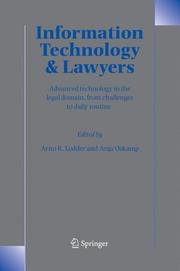
ISBN: 1280461713 9786610461714 1402041462 1402041454 9048170591 Year: 2006 Publisher: Dordrecht : Springer,
Abstract | Keywords | Export | Availability | Bookmark
 Loading...
Loading...Choose an application
- Reference Manager
- EndNote
- RefWorks (Direct export to RefWorks)
The area of Information Technology & Lawyers is a fascinating one. Both from a practical and an academic perspective the opportunities of applying Information Technology to law are tremendous. At the same time, however, lawyers are amongst the most conservative professionals, and traditional late adapters of technology. Nowadays the gap between Information Technology & Lawyers is closing more and more, in particular due to the Internet and the richness of legal sources that can be found online. This book provides material to further bridge the gap by showing people with a legal background what is possible with Information Technology now and in the near future, as well as by showing people with an IT background what opportunities exist in the domain of law. Any lawyer should read this book about the current practice of IT in the legal domain, and what is to be expected in the near future. The book is meant for both practitioners and academics, and can serve in any (post)graduate courses on computer science, law, business, etc. The editors Arno R. Lodder and Anja Oskamp are both affiliated to the Computer/Law Institute of the Vrije Universiteit Amsterdam, and before co-edited books on IT support of the Judiciary, as well as the first two editions of the Dutch handbook on IT & Lawyers.
Legal research --- Practice of law --- Technology and law. --- Law and technology --- Law --- Law practice --- Data processing. --- Automation. --- Practice --- Information systems. --- Law. --- Artificial intelligence. --- Computer Appl. in Arts and Humanities. --- Law, general. --- Information Systems Applications (incl. Internet). --- Artificial Intelligence. --- Theories of Law, Philosophy of Law, Legal History. --- AI (Artificial intelligence) --- Artificial thinking --- Electronic brains --- Intellectronics --- Intelligence, Artificial --- Intelligent machines --- Machine intelligence --- Thinking, Artificial --- Bionics --- Cognitive science --- Digital computer simulation --- Electronic data processing --- Logic machines --- Machine theory --- Self-organizing systems --- Simulation methods --- Fifth generation computers --- Neural computers --- Acts, Legislative --- Enactments, Legislative --- Laws (Statutes) --- Legislative acts --- Legislative enactments --- Jurisprudence --- Legislation --- Technology and law --- Data processing --- Automation --- Application software. --- Law—Philosophy. --- Application computer programs --- Application computer software --- Applications software --- Apps (Computer software) --- Computer software --- Philosophy.
Book
ISBN: 1280701056 9786610701056 1402049196 Year: 2006 Volume: v. 77 Publisher: Dordrecht ; [Great Britain] : Springer,
Abstract | Keywords | Export | Availability | Bookmark
 Loading...
Loading...Choose an application
- Reference Manager
- EndNote
- RefWorks (Direct export to RefWorks)
Arguing Fundamental Rights explores the path-breaking Theory of Constitutional Rights of Robert Alexy. The critical analysis of the structural elements of Alexy’s theory is combined with an assessment of its applied relevance, with special attention being paid to the UK Human Rights Act and the fundamental rights protection in the European Union (before and after the Charter of Fundamental Rights of 2000). The book is unique in combining a challenging interpretation of one the foremost European conceptions of fundamental rights with the discussion of the pragmatics of constitutional adjudication. The chapters combine a focus on key political questions such as whether rights adjudication can be subject to rational assessment and whether judges (and not democratically elected parliaments) should be the umpires of fundamental rights protection, with a concern with key jurisprudential issues, such as the determination of the limits of fundamental rights, the binding effect of fundamental rights to private parties, or whether certain fundamental rights should or should not be regarded as ultimate reasons for action, and as such, could be not be limited, not even when it conflict with other rights. Robert Alexy himself opens the book with an insightful contextualisation of his theory of fundamental rights within his general legal theory. The book is a timely defence of practical reason against claims that emergencies justify trumping fundamental rights.
Civil rights. --- Constitutional law. --- Alexy, Robert. --- Constitutional law --- Constitutional limitations --- Constitutionalism --- Constitutions --- Limitations, Constitutional --- Public law --- Administrative law --- Basic rights --- Civil liberties --- Civil rights --- Constitutional rights --- Fundamental rights --- Rights, Civil --- Human rights --- Political persecution --- Interpretation and construction --- Law and legislation --- Law. --- Philosophy of law. --- Public law. --- Philosophy, modern. --- Law, general. --- Philosophy of Law. --- Theories of Law, Philosophy of Law, Legal History. --- Public Law. --- Private International Law, International & Foreign Law, Comparative Law . --- Modern Philosophy. --- Modern philosophy --- Law --- Acts, Legislative --- Enactments, Legislative --- Laws (Statutes) --- Legislative acts --- Legislative enactments --- Jurisprudence --- Legislation --- Political science. --- Law—Philosophy. --- Public law . --- Private international law. --- Conflict of laws. --- Modern philosophy. --- Choice of law --- Conflict of laws --- Intermunicipal law --- International law, Private --- International private law --- Private international law --- Legal polycentricity --- Administration --- Civil government --- Commonwealth, The --- Government --- Political theory --- Political thought --- Politics --- Science, Political --- Social sciences --- State, The --- Civil law
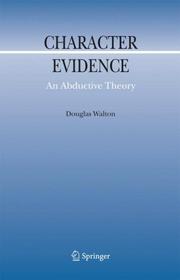
ISBN: 128106744X 9786611067441 1402049439 1402049420 9048172357 Year: 2006 Volume: v. 11 Publisher: Dordrecht : Springer,
Abstract | Keywords | Export | Availability | Bookmark
 Loading...
Loading...Choose an application
- Reference Manager
- EndNote
- RefWorks (Direct export to RefWorks)
This book is on evidence for character judgments, answering questions about how such judgments are and should be supported or refuted by verifiable evidence. For example, if I claim that some particular person has integrity, or does not, what kind of justification should properly be used to support or refute the claim? This book answers the question using a model of abductive reasoning, commonly called inference to the best explanation. The methodology of the book derives from recent work on models of reasoning in argumentation theory and artificial intelligence. The aim is not just to show how character judgments are made, but to show how they should be properly be made based on sound reasoning, in order to avoid errors and superficial judgments of a kind that are common. Character evidence in law is on a razor’s edge. It is generally inadmissible, for it might tend to prejudice a jury, but it is a kind of evidence often needed in trials, for example, to cross-examine a witness. This book shows that we are not as good at judging character as we think, and often make serious mistakes. But it is shown how character judgments can, in some instances, be based on good reasoning supported by factual evidence in a case.
Reputation (Law) --- Examination of witnesses --- Abduction (Logic) --- Artificial intelligence. --- Psychological aspects. --- AI (Artificial intelligence) --- Artificial thinking --- Electronic brains --- Intellectronics --- Intelligence, Artificial --- Intelligent machines --- Machine intelligence --- Thinking, Artificial --- Bionics --- Cognitive science --- Digital computer simulation --- Electronic data processing --- Logic machines --- Machine theory --- Self-organizing systems --- Simulation methods --- Fifth generation computers --- Neural computers --- Logic --- Reasoning --- Syllogism --- Evidence (Law) --- Trial practice --- Witnesses --- Evidence, Character --- Fama publica --- Character evidence --- Law and legislation --- Philosophy of law. --- Criminal Law. --- Philosophy of Law. --- Theories of Law, Philosophy of Law, Legal History. --- Criminal Law and Criminal Procedure Law. --- Crime --- Crimes and misdemeanors --- Criminals --- Law, Criminal --- Penal codes --- Penal law --- Pleas of the crown --- Public law --- Criminal justice, Administration of --- Criminal procedure --- Legal status, laws, etc. --- Political science. --- Law—Philosophy. --- Law. --- Criminal law. --- Acts, Legislative --- Enactments, Legislative --- Laws (Statutes) --- Legislative acts --- Legislative enactments --- Jurisprudence --- Legislation --- Administration --- Civil government --- Commonwealth, The --- Government --- Political theory --- Political thought --- Politics --- Science, Political --- Social sciences --- State, The
| Listing 1 - 10 of 12 | << page >> |
Sort by
|

 Search
Search Feedback
Feedback About UniCat
About UniCat  Help
Help News
News